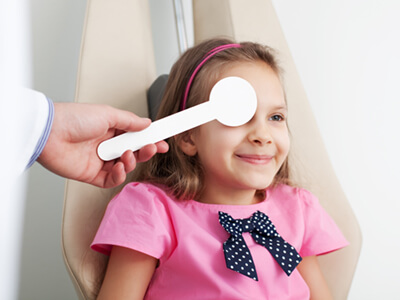Pediatric Eye Exams

Eye or vision problems can delay a baby or child’s development. It is important to detect these problems as early as possible so children can get the help they need to grow and develop. If you notice any signs of vision problems in your child, such as abnormal eye movements, in or out-turning of the eyes, closure of one eye to see or any delays in tracking objects, please bring these concerns to your pediatrician and schedule an eye exam as soon as possible.
Vision Screening
It is essential to check children’s vision when they are first born and again during infancy, preschool and school years. Screening can be performed by a pediatrician, family physician or other properly trained health care provider. It is also often offered at schools, community health centers or community events.
The American Academy of Ophthalmology and the American Association for Pediatric Ophthalmology and Strabismus recommend the following exams:
Newborn
An ophthalmologist, pediatrician, family doctor or other trained health professional should examine a newborn baby’s eyes and perform a red reflex test (a basic indicator that the eyes are normal). An ophthalmologist should perform a comprehensive exam if the baby is premature or at high risk for medical problems for other reasons, has signs of abnormalities, or has a family history of serious vision disorders in childhood.
Infant

A second screening for eye health should be done by an ophthalmologist, pediatrician, family doctor or other trained health professional at a well-child exam between six months and the first birthday.
Preschooler
Between the ages of 3 and 3½, a child’s vision and eye alignment should be assessed by a pediatrician, family doctor, ophthalmologist, optometrist, orthoptist or person trained in vision assessment of preschool children.
School age
Upon entering school, or whenever a problem is suspected, children’s eyes should be screened for visual acuity and alignment by a pediatrician, family doctor, ophthalmologist, optometrist, orthoptist or person trained in vision assessment of school-aged children, such as a school nurse.
If misaligned eyes (strabismus), “lazy eye” (amblyopia), refractive errors (myopia, hyperopia, astigmatism) or another focusing problem is suspected in the initial screening, the child should have a comprehensive exam. It’s important to begin treatment as soon as possible to ensure successful vision correction and life-long benefits.
At Eye Consultants of Fargo, PLLC, we offer a range of pediatric eye care from routine exams to treatment of amblyopia, strabismus and other pediatric eye disorders. Sometimes patients may require referral to a pediatric ophthalmologist for further treatment and we can help you coordinate that care if needed.


